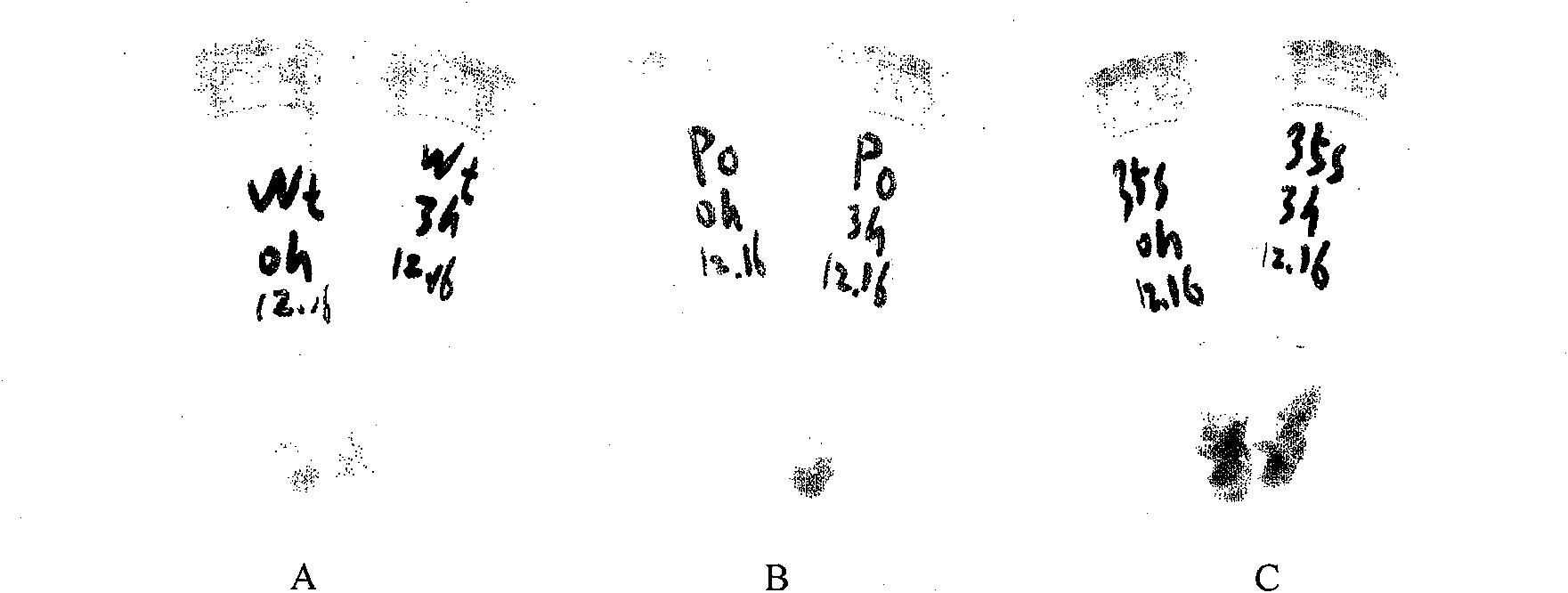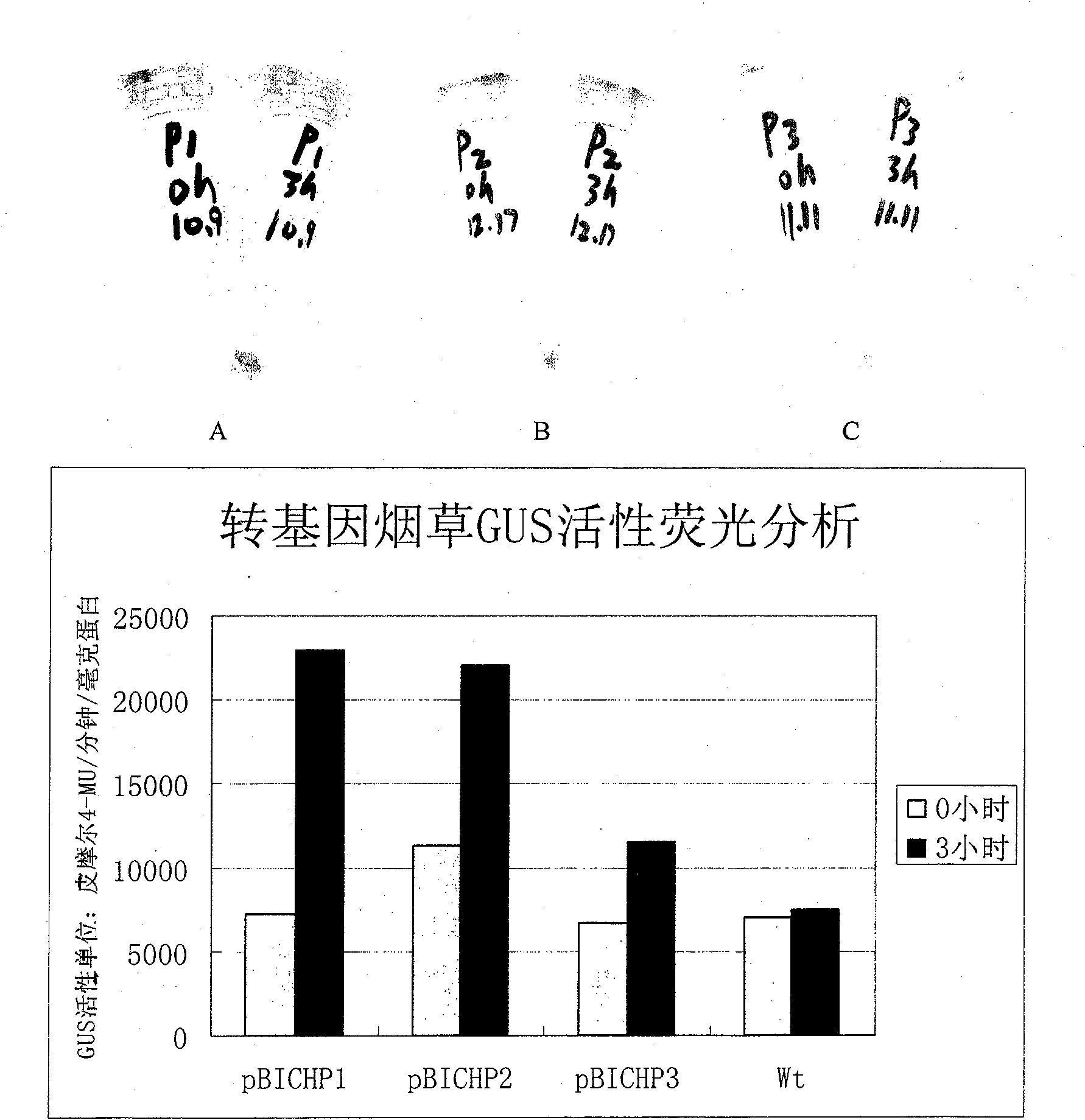Inducible promoter separated from leaf mustard
A promoter and selected technology, applied in the field of genetic engineering, can solve problems such as toxicity, unfavorable normal plant growth, and weak expression activity
- Summary
- Abstract
- Description
- Claims
- Application Information
AI Technical Summary
Problems solved by technology
Method used
Image
Examples
Embodiment 1
[0029] Example 1 Isolation of the BjCHI1 gene promoter (BjC-p) from the mustard genome by linker PCR
[0030] 1.1 Preparation of mustard genomic DNA
[0031] For mustard greens (Brassica juncea) planted indoors for one month, take about 3 grams of young leaves, refer to the method of McCouch et al. (McCouch S.P., et al., Molecular mapping of rice chromosome, Theor Appl Genet, 1988, 76: 815-829) Genomic DNA was extracted by SDS method. The extracted genomic DNA of mustard was detected by agarose gel electrophoresis, and the concentration was measured by an ultraviolet spectrophotometer and stored at -20°C.
[0032] 1.2 Enzyme digestion and adapter ligation of mustard genomic DNA
[0033] Referring to the method of Siebert et al. (Siebert P.D., et al., An improved PCR method for walking inuncloned genomic DNA, Nucleic Acids Research, 1995, 23 (6): 1087-1088), take 2 micrograms of mustard genomic DNA, and use restriction The endonucleases EcoR V, Dra I and Sma I were completel...
Embodiment 2
[0038] Example 2 Verification of promoter function
[0039] It is carried out by connecting the promoter with the reporter gene, and then transforming it into plants to detect the expression of the reporter gene.
[0040] 2.1 Construction of recombinant expression vector pBICHP0
[0041] pBICHPO was constructed by replacing the 35S promoter sequence upstream of the GUS gene in the expression vector pBI121 with the BjC-p promoter (92nd to 1378th nucleotides shown in SEQ ID NO: 1) sequence. The plant binary expression vector pBI121 as expression vector contains neomycin phosphotransferase gene (NptII) and β-glucuronidase (GUS) gene as reporter gene. Obtain the BjC-p promoter sequence (92nd to 1378th nucleotides shown in SEQ ID NO: 1) from Brassica juncea genome by PCR method, the used PCR primer pair:
[0042] KjXeB11: 5'-TAA AGC TTT CTC AAA TAT GAG GTT TTA CTA TTC AT-3' (SEQ ID NO: 8)
[0043] KjWXF7: 5′-TAG GAT CCG TTT CTC TGA GCT GTA TGG TTG-3′ (SEQ ID NO: 9) Since HindIII a...
Embodiment 3
[0050] The promoter activity analysis of embodiment 3 truncated
[0051] Researchers believe that there is an active region in the above-mentioned full-length promoter, so the full-length promoter shown by SEQ ID NO: 1 (nucleotides 92 to 1378 shown in SEQ ID NO: 1) has been truncated, The corresponding truncated promoters were obtained to analyze their activity.
[0052] 3.1 Construction of recombinant expression vector
[0053] Using the pBICHP0 plasmid as a template, PCR amplification was performed using the corresponding primer pairs to obtain three truncated promoter sequences, and the following expression vectors were constructed:
[0054] 1) The 302nd to 1378th nucleotides shown in SEQ ID NO: 1 are used as a promoter, amplified by primers KjXeB1 and KjWXF7, and the constructed vector is called pBICHP1;
[0055] 2) The 456th to 1378th nucleotides shown in SEQ ID NO: 1 are used as a promoter, amplified by primers KjXeB2 and KjWXF7, and the constructed vector is called pB...
PUM
 Login to View More
Login to View More Abstract
Description
Claims
Application Information
 Login to View More
Login to View More - R&D
- Intellectual Property
- Life Sciences
- Materials
- Tech Scout
- Unparalleled Data Quality
- Higher Quality Content
- 60% Fewer Hallucinations
Browse by: Latest US Patents, China's latest patents, Technical Efficacy Thesaurus, Application Domain, Technology Topic, Popular Technical Reports.
© 2025 PatSnap. All rights reserved.Legal|Privacy policy|Modern Slavery Act Transparency Statement|Sitemap|About US| Contact US: help@patsnap.com



